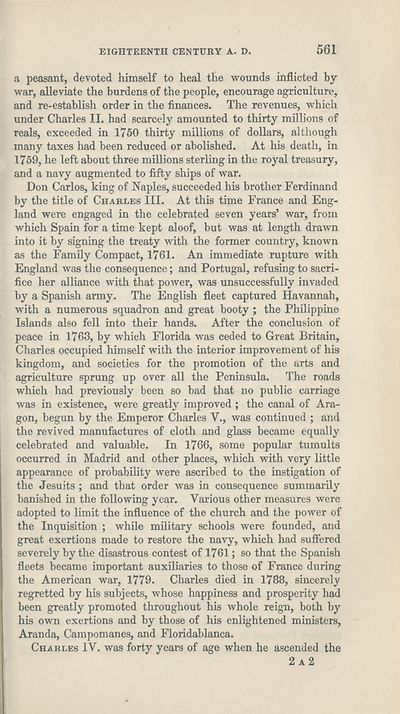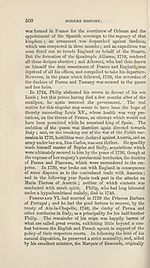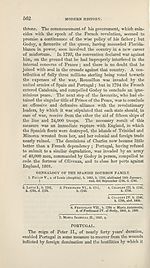Download files
Complete book:
Individual page:
Thumbnail gallery: Grid view | List view

EIGHTEENTH CENTURY A. D.
561
a peasant, devoted himself to heal the wounds inflicted by
war, alleviate the burdens of the people, encourage agriculture,
and re-establish order in the finances. The revenues, which
under Charles II. had scarcely amounted to thirty millions of
reals, exceeded in 1750 thirty millions of dollars, although
many taxes had been reduced or abolished. At his death, in
1769, he left about three millions sterling in the royal treasury,
and a navy augmented to fifty ships of war.
Don Carlos, king of Naples, succeeded his brother Ferdinand
by the title of Charles III. At this time France and Eng¬
land were engaged in the celebrated seven years’ war, from
which Spain for a time kept aloof, but was at length drawn
into it by signing the treaty with the former country, known
as the Family Compact, 1761. An immediate rupture with
England was the consequence; and Portugal, refusing to sacri¬
fice her alliance with that power, was unsuccessfully invaded
by a Spanish army. The English fleet captured Havannah,
with a numerous squadron and great booty ; the Philippine
Islands also fell into their hands. After the conclusion of
peace in 1763, by which Florida was ceded to Great Britain,
Charles occupied himself with the interior improvement of his
kingdom, and societies for the promotion of the arts and
agriculture sprung up over all the Peninsula. The roads
which had previously been so bad that no public carriage
was in existence, were greatly improved ; the canal of Ara¬
gon, begun by the Emperor Charles V., was continued ; and
the revived manufactures of cloth and glass became equally
celebrated and valuable. In 1766, some popular tumults
occurred in Madrid and other places, which with very little
appearance of probability were ascribed to the instigation of
the Jesuits ; and that order was in consequence summarily
banished in the following year. Various other measures were
adopted to limit the influence of the church and the power of
the Inquisition ; while military schools were founded, and
great exertions made to restore the navy, which had suffered
severely by the disastrous contest of 1761; so that the Spanish
fleets became important auxiliaries to those of France during
the American war, 1779. Charles died in 1788, sincerely
regretted by his subjects, whose happiness and prosperity had
been greatly promoted throughout his whole reign, both by
his own exertions and by those of his enlightened ministers,
Aranda, Campomanes, and Floridablanca.
Charles IV. was forty years of age when be ascended the
2 a 2
561
a peasant, devoted himself to heal the wounds inflicted by
war, alleviate the burdens of the people, encourage agriculture,
and re-establish order in the finances. The revenues, which
under Charles II. had scarcely amounted to thirty millions of
reals, exceeded in 1750 thirty millions of dollars, although
many taxes had been reduced or abolished. At his death, in
1769, he left about three millions sterling in the royal treasury,
and a navy augmented to fifty ships of war.
Don Carlos, king of Naples, succeeded his brother Ferdinand
by the title of Charles III. At this time France and Eng¬
land were engaged in the celebrated seven years’ war, from
which Spain for a time kept aloof, but was at length drawn
into it by signing the treaty with the former country, known
as the Family Compact, 1761. An immediate rupture with
England was the consequence; and Portugal, refusing to sacri¬
fice her alliance with that power, was unsuccessfully invaded
by a Spanish army. The English fleet captured Havannah,
with a numerous squadron and great booty ; the Philippine
Islands also fell into their hands. After the conclusion of
peace in 1763, by which Florida was ceded to Great Britain,
Charles occupied himself with the interior improvement of his
kingdom, and societies for the promotion of the arts and
agriculture sprung up over all the Peninsula. The roads
which had previously been so bad that no public carriage
was in existence, were greatly improved ; the canal of Ara¬
gon, begun by the Emperor Charles V., was continued ; and
the revived manufactures of cloth and glass became equally
celebrated and valuable. In 1766, some popular tumults
occurred in Madrid and other places, which with very little
appearance of probability were ascribed to the instigation of
the Jesuits ; and that order was in consequence summarily
banished in the following year. Various other measures were
adopted to limit the influence of the church and the power of
the Inquisition ; while military schools were founded, and
great exertions made to restore the navy, which had suffered
severely by the disastrous contest of 1761; so that the Spanish
fleets became important auxiliaries to those of France during
the American war, 1779. Charles died in 1788, sincerely
regretted by his subjects, whose happiness and prosperity had
been greatly promoted throughout his whole reign, both by
his own exertions and by those of his enlightened ministers,
Aranda, Campomanes, and Floridablanca.
Charles IV. was forty years of age when be ascended the
2 a 2
Set display mode to:
![]() Universal Viewer |
Universal Viewer | ![]() Mirador |
Large image | Transcription
Mirador |
Large image | Transcription
| Antiquarian books of Scotland > Education > Elements of universal history on a new and systematic plan > (581) |
|---|
| Permanent URL | https://digital.nls.uk/127587112 |
|---|
| Description | Thousands of printed books from the Antiquarian Books of Scotland collection which dates from 1641 to the 1980s. The collection consists of 14,800 books which were published in Scotland or have a Scottish connection, e.g. through the author, printer or owner. Subjects covered include sport, education, diseases, adventure, occupations, Jacobites, politics and religion. Among the 29 languages represented are English, Gaelic, Italian, French, Russian and Swedish. |
|---|

